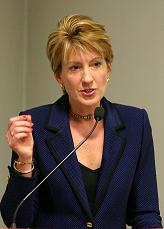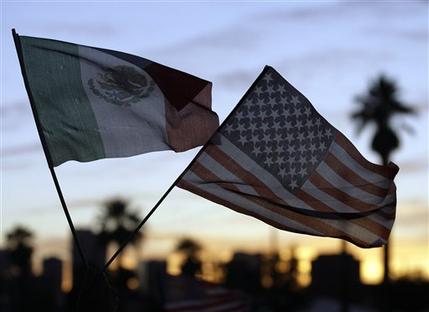MEXICO CITY Mexico looked beyond its drug war to throw a 200th birthday bash celebrating a proud history, whimsical culture and resilience embodied in the traditional independence cry: “Viva Mexico!”Across the capital, hundreds of thousands of people flooded the streets despite their fears, blowing horns and dancing alongside a parade of serpent floats, marching cacti and 13-foot-tall warrior marionettes and staying late into the night at open-air concerts.President Felipe Calderon capped the evening by ringing the original independence bell from a balcony in the Zocalo square and delivering “El Grito,” patterned on founding father Miguel Hidalgo’s 1810 call to arms against Spain: “Long live independence. Love live the bicentennial … Long live Mexico!”Roaring thousands echoed his cry as fireworks exploded in the square and at the iconic Angel of Independence about 2 miles (3.2 kilometers) down the city’s crowded main promenade.
 “I love being Mexican!” said Michel Dosal, wearing a green, white and red Mohawk wig. “The 15th of September is better than Christmas. It’s better than my birthday!”In cities where drug violence is heaviest, festivities were more subdued. The grito was canceled in Ciudad Juarez for the first time in its history. People still showed their patriotism in the border city – Mexico’s most violent – by hanging Mexican flags from their roofs and hosting family dinners.
“I love being Mexican!” said Michel Dosal, wearing a green, white and red Mohawk wig. “The 15th of September is better than Christmas. It’s better than my birthday!”In cities where drug violence is heaviest, festivities were more subdued. The grito was canceled in Ciudad Juarez for the first time in its history. People still showed their patriotism in the border city – Mexico’s most violent – by hanging Mexican flags from their roofs and hosting family dinners.
In the western city of Morelia, the scene of a cartel-related grenade attack that killed eight during the 2008 independence celebration, barely 2,000 showed up at the main plaza for a “grito” that once drew tens of thousands.”My son asked me to take him to see the grito, so I brought him despite my fears,” said Silvia Godinez Perez, a secretary. “We can’t easily forget what happened two years ago.”
But in Mexico City, a $40 million fiesta, two years in the making, drew people from across the country to the main Reforma Avenue and Zocalo. Moments before Calderon emerged on the balcony of the National Palace, a voice boomed from loudspeakers: “Let’s show the world that Mexico is strong and standing.””This one is special,” said Iris Mari Rodriguez Montiel, a small business owner who had traveled from the Gulf Coast state of Veracruz and waited since morning for the festivities to start. “It gives me chills just to think about it.”
Little girls wearing ribbons of the Mexican flag watched the 1.7-mile (2.7-kilometer) parade down Reforma from the shoulders of their fathers. Other children blew trumpets as the air filled with confetti.”It’s like a Carnival of Rio, plus an Olympic ceremony, plus Woodstock all put together in the same day,” said artistic director Marco Balich, who produced the opening and closing ceremonies of the 2006 Turin Winter Olympics. “For the cost of a warplane, you can celebrate the birthday of a country.”
Several neighboring heads of state and U.S. Labor Secretary Hilda Solis attended.Still, anxiety hovered over the festivities in a country that most recently has seen car bombs, the assassination of a gubernatorial candidate, and the massacre of 72 migrants who refused to smuggle drugs for a brutal gang.Military helicopters buzzed overhead in the capital, heavily armed federal agents and metal detectors greeted revelers.
The Interior Department said there were no attacks against the celebrations. Prosecutors in the Caribbean coast resort of Cancun said they were investigating whether six men detained with assault rifles and hand grenades had planned an assault on bicentennial festivities. In northern Nuevo Leon state, eight gunmen were killed in a shootout with soldiers, authorities said.”In Mexico, we all live in fear. And the worst part is that we are starting to get used to it,” said Eric Limon, 33, a professional dancer who volunteered to wear a jaguar mask and swing a colorful Aztec club and spear for the parade.
“I want to be part of something important,” he said. “I know this won’t solve our problems, but this is my grain of sand to create a sense of unity. This is what Mexico needs.”Those who stayed away from the city center celebrated from their rooftops and staged their own neighborhood fireworks displays. All night long, rockets whistled and boomed skyward, blanketing the yards and streets with smoke.(AP)





